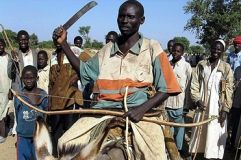Villagers flee ethnic violence in eastern Chad
Nov 11, 2006 (GOZ BEIDA, Chad) — An exodus is going on in eastern Chad, as villagers flee by foot or donkey, raids by Arab horsemen which have terrorized the region over recent days.
 “We are going to Goz Beida,” said one woman as she walked towards this town on Chad’s side of the border with the conflict-ravaged Darfur provinces of Sudan.
“We are going to Goz Beida,” said one woman as she walked towards this town on Chad’s side of the border with the conflict-ravaged Darfur provinces of Sudan.
“We are coming from Ganachour, our husbands remained behind,” she said.
She is one of hundreds and thousands of villagers, who have thrown together a few possessions, who are streaming through the hills in the region in multicoloured columns to escape the ethnic violence.
UNHCR spokeswoman Helene Caux on Thursday said the inter-agency humanitarian team estimated that at least 220 people had been killed and their village huts razed across an area south of Goz Beida, mostly villagers from non-Arab communities.
The ethnic violence came in the wake of clashes in the region late in October between government soldiers and a newly formed rebel alliance, the Union of Forces for Democracy and Development (UFDD), which seized Goz Beida and another town for a day.
The people fleeing are mainly women and children, weighed down with heavy packages, pans, mats and a few foodstuffs. The most organized and the quickest might have had time to cobble together a mattress or a bed under their donkey.
Hovering around them, and around the few villages which have been spared raids by Arab horsemen, circle groups of men armed only with bows and arrows, who boast of being charged with protecting their people.
“Our strategy is to travel in groups. And when we hear shots everyone tries to take up position to defend himself,” said Mahamat, in his early 20s, one of the unlikely warriors.
“If you die you die. Some run away and so much for them,” he said. “The best that can happen is that you split open your attackers,” says Mahamat who says he never gets separated from his bow and arrow.
He admits that the bow is meager protection faced with the Kalashnikov assault rifles of the Arab raiders, mostly on horseback, who have terrorised the non-Arab people of the border region for almost a week, with no explanation from authorities.
“A traditional arrow is no match for their weapons,” said Mahamat.
“They can reach us from the mountains, but we cannot reach them with our arrows.”
And that is why most people in the region have chosen to flee.
In Sanour, too, villagers are getting ready to leave their huts and to hit the road to seek refuge with international humanitarian organisations who are installed 10 kilometres (six miles) away in Goz Beida.
“The Arabs have warned that they are going to attack, that we should gather our cattle and leave,” said one of the villagers. “They have even killed someone. We found his body and planned to bury him.”
However the surge of refugees to Goz Beida is beginning to worry the authorities, for mainly economic but also health and hygiene reasons.
The head of one of the town’s districts, Mourse Bauche Mahamat, has gone to meet Sanour villagers to try and persuade them to stay.
“The people have to remain to sow their fields,” he said, before calling the villagers who were preparing to leave on their donkeys.
“If the state wants these people it has to intervene. Otherwise they will end up with nothing and not be able to do their harvest,” he said.
“Here you are in one of Chad’s breadbaskets. And if there’s no harvest it’s the food security of the region and all the country that is threatened.”
(AFP)
